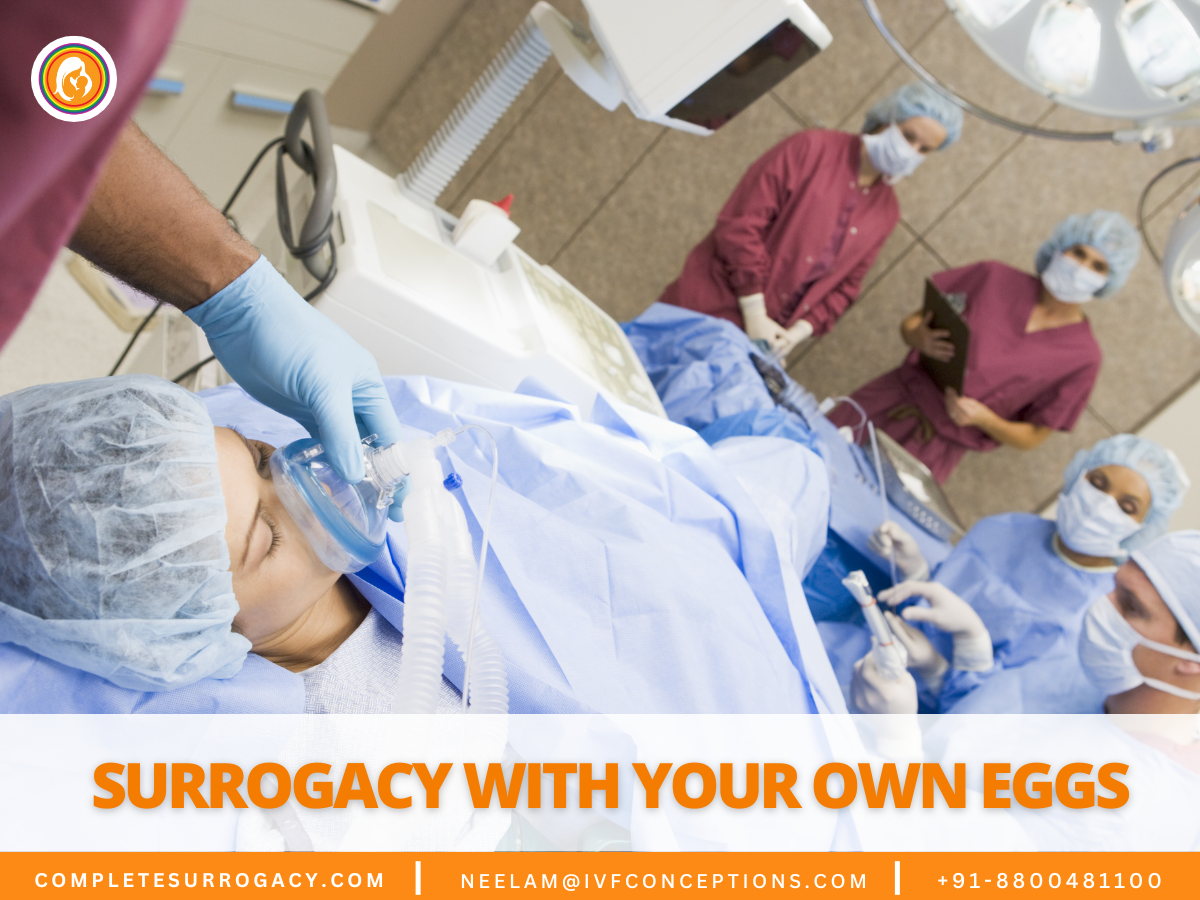Surrogacy With Your Own Eggs: A Comprehensive Guide for Intended Parents

Surrogacy With Your Own Eggs is an increasingly popular option for individuals and couples who wish to maintain a biological connection with their child while overcoming fertility challenges. This form of gestational surrogacy enables intended mothers to use their own eggs, which are fertilized with either the intended father’s sperm or donor sperm, before being implanted into a gestational carrier.
This process is ideal for women who can produce viable eggs but cannot carry a pregnancy due to medical conditions such as uterine abnormalities, recurrent pregnancy loss, or age-related infertility. By utilizing IVF with egg retrieval, intended parents can achieve their dream of having a genetically related child while ensuring a safe and healthy pregnancy with the help of a surrogate.
- Book an online appointment: Get a free online consultation.
- Call\W:+91-8800481100 Email:neelam@ivfconceptions.com
Understanding the cost of surrogacy with your own eggs, the legal aspects, and medical requirements is crucial for a smooth and successful journey.
While surrogacy with your own eggs opens the door to genetic parenthood, it involves several layers of complexity, including medical, legal, and financial considerations. This guide will walk you through each step, providing updated and detailed insights to help you make informed decisions. We’ll discuss the process, eligibility, costs, potential risks, and much more, ensuring you have all the information you need for this significant journey.
More Resources to Read:
Surrogacy Guide for Surrogate Mothers
Surrogacy Guide for Intended Parents
How does the surrogacy process work
Understanding Surrogacy with Your Own Eggs
Surrogacy with your own eggs is a multi-faceted process designed to allow individuals or couples to achieve parenthood while preserving a biological connection to their child. Below, we break down the essential components of this process.
Understanding Surrogacy with Your Own Eggs
1. The Medical Process
| Step | Description |
| Ovarian Stimulation | Hormonal treatments stimulate the ovaries to produce multiple eggs. |
| Egg Retrieval | Eggs are retrieved through a minimally invasive procedure. |
| Fertilization | Eggs are fertilized with sperm to create embryos. |
| Embryo Transfer | Viable embryos are transferred to the surrogate’s uterus. |
1. The Medical Process
- Ovarian Stimulation and Egg Retrieval: The journey begins with ovarian stimulation, where fertility specialists use hormonal treatments to stimulate the ovaries to produce multiple eggs. This process is carefully monitored through ultrasounds and blood tests to ensure the eggs are maturing properly. Once the eggs are ready, they are retrieved through a minimally invasive procedure.
- Fertilization: The retrieved eggs are then fertilized in a laboratory setting using either the intended father’s sperm or donor sperm. This process, known as in vitro fertilization (IVF), results in the creation of embryos.
- Embryo Transfer: After fertilization, the embryos are cultured for several days to select the most viable ones. These embryos are then transferred to the surrogate’s uterus. The surrogate carries the pregnancy to term, and upon birth, the intended parents gain custody of the child.
2. Eligibility Criteria for Intended Parents
- Medical Conditions: Intended mothers who are unable to carry a pregnancy due to medical conditions like uterine abnormalities, severe health risks, or recurrent miscarriages often turn to surrogacy.
- LGBTQ+ Couples: Surrogacy with your own eggs is also a popular option among LGBTQ+ couples, particularly gay male couples using donor eggs, who seek a biological connection to their child.
- Single Individuals: Single individuals who wish to have a biological child can also pursue this option by using their own eggs and a surrogate.
Eligibility Criteria for Intended Parents
| Eligibility Group | Description |
| Medical Conditions | For women unable to carry a pregnancy due to health issues. |
| LGBTQ+ Couples | Particularly popular among gay male couples using donor eggs. |
| Single Individuals | Single men or women who want a biological child. |
3. Legal Considerations
Surrogacy laws vary widely across different countries and even within regions of the same country. Here’s an overview of legal aspects to consider:
- Surrogacy Agreements: Before starting the process, it’s crucial to draft a surrogacy agreement. This legal document outlines the rights, responsibilities, and expectations of both the intended parents and the surrogate. It covers issues like custody, parental rights, financial obligations, and contingencies for medical or pregnancy-related complications.
- Legal Parentage: Establishing legal parentage is a critical step. In many jurisdictions, intended parents may need to go through a court process to be recognized as the legal parents of the child. This process can include pre-birth orders or adoption, depending on the local laws.
- International Surrogacy: If you’re considering international surrogacy, be aware of the legal complexities. Some countries have clear surrogacy laws, while others may have restrictions or outright bans. It’s essential to work with a knowledgeable surrogacy attorney who understands the legal landscape of both your home country and the surrogate’s country.

4. Emotional Considerations
- Support Systems: The emotional journey of surrogacy can be intense for both the intended parents and the surrogate. It’s vital to have a strong support system, including counseling services, to navigate the emotional complexities.
- Relationship with the Surrogate: Building a positive relationship with the surrogate is crucial. Open communication, respect, and mutual understanding contribute to a smoother process and a healthy pregnancy.
Cost of Surrogacy with Your Own Eggs
Surrogacy with your own eggs is a significant financial investment, and costs can vary widely depending on location, legal requirements, and the complexity of the case. Here’s a detailed breakdown of potential expenses:
Cost of Surrogacy with Your Own Eggs
1. Medical Costs
| Cost Component | Estimated Cost |
| Ovarian Stimulation and Egg Retrieval | $10,000 – $20,000 |
| IVF and Embryo Transfer | $8,000 – $15,000 |
| Pregnancy Monitoring and Delivery | $5,000 – $10,000 |
2. Legal Fees
| Legal Requirement | Estimated Cost |
| Surrogacy Agreement | $5,000 – $10,000 |
| Court Proceedings (if needed) | $3,000 – $5,000 |
3. Surrogate Compensation
| Compensation Type | Estimated Cost |
| Base Compensation | $20,000 – $50,000 |
| Additional Expenses | $5,000 – $10,000 |
4. Agency Fees
| Agency Service | Estimated Cost |
| Surrogacy Agency | $15,000 – $30,000 |
1. Medical Costs
- Ovarian Stimulation and Egg Retrieval: This includes the cost of medications, monitoring, and the egg retrieval procedure. Depending on the clinic and country, this can range from $10,000 to $20,000.
- IVF and Embryo Transfer: The cost of fertilization and embryo transfer can range from $8,000 to $15,000. This includes laboratory fees, embryologist fees, and the cost of transferring embryos to the surrogate.
- Pregnancy Monitoring and Delivery: Ongoing monitoring of the pregnancy and the cost of delivery are also significant. These expenses can vary, but generally, they range from $5,000 to $10,000.

2. Legal Fees
- Surrogacy Agreement: Drafting and finalizing the surrogacy agreement can cost between $5,000 and $10,000, depending on the complexity and the legal environment of the country.
- Court Proceedings: In some cases, you may need to go through legal proceedings to establish parentage, which can add another $3,000 to $5,000.
3. Surrogate Compensation
- Base Compensation: Surrogates typically receive base compensation, which can range from $20,000 to $50,000 depending on the country and the surrogate’s experience.
- Additional Expenses: These include medical expenses, maternity clothing, travel, and other pregnancy-related costs, often amounting to an additional $5,000 to $10,000.
4. Agency Fees
- Surrogacy Agency: Working with a surrogacy agency can add $15,000 to $30,000 to your total cost. Agencies provide services such as matching you with a surrogate, coordinating medical procedures, and offering support throughout the process.
5. Additional Financial Considerations
- Insurance: Not all insurance plans cover surrogacy-related expenses. You may need to purchase a separate insurance policy for the surrogate, adding to your costs.
- Financial Planning: Consider the long-term financial implications, including the costs of raising a child, education, healthcare, and other future expenses.
How Does Surrogacy with Your Own Eggs Work?
The process of surrogacy with your own eggs is highly coordinated and involves multiple steps:
1. Initial Consultations
- Fertility Assessment: The process begins with consultations where fertility specialists assess the intended mother’s health and fertility to ensure she is a candidate for egg retrieval.
- Surrogate Screening: The surrogate undergoes medical and psychological evaluations to ensure she is physically and emotionally capable of carrying a pregnancy.
2. Medical Procedures
- Ovarian Stimulation: Hormonal treatments are administered to stimulate the ovaries to produce multiple eggs. This stage requires careful monitoring to optimize egg production and minimize risks.
- Egg Retrieval: Once the eggs are mature, they are retrieved through a minimally invasive procedure performed under sedation. This step typically takes place in an outpatient setting.
- Fertilization and Embryo Culture: The retrieved eggs are fertilized with sperm, and the resulting embryos are cultured for several days to assess their viability.
- Embryo Transfer: The healthiest embryos are selected and transferred to the surrogate’s uterus, where they will hopefully implant and develop into a successful pregnancy.

3. Pregnancy and Birth
- Monitoring and Support: Throughout the pregnancy, the surrogate is closely monitored by medical professionals to ensure the health of both the surrogate and the developing fetus. Regular check-ups, ultrasounds, and other tests are conducted.
- Delivery: The surrogate gives birth, and the intended parents typically assume custody of the child immediately after birth, as outlined in the surrogacy agreement.
4. Post-Birth Legal Steps
- Establishing Parentage: Depending on the jurisdiction, you may need to go through legal processes to be recognized as the legal parents of the child. This step is crucial to ensuring your rights as the child’s parents are legally protected.
More Resources to Read:
Infertility Treatment and Surrogacy Process
9 Factors To Improve IVF Pregnancy Rate
International Surrogacy Options Worldwide
Surrogacy Guide for Surrogate Mothers
Conclusion
Surrogacy with your own eggs is a complex but rewarding path to parenthood that offers the chance to maintain a genetic connection with your child. However, it requires careful planning, legal safeguards, and emotional preparedness.
By understanding the medical processes, legal frameworks, financial obligations, and emotional considerations involved, intended parents can approach this journey with confidence and clarity.
Working with experienced professionals, including fertility specialists, legal experts, and surrogacy agencies, is essential to navigating this intricate process. With the right support and information, surrogacy with your own eggs can be a fulfilling path to building the family you’ve always dreamed of.
If you’d like to learn more about IVF, Egg Donation, or surrogacy services globally, check out the rest of our website at Complete Surrogacy Agency. We offer legally secure and affordable surrogacy consulting services for FREE.
Complete Surrogacy: Your Trusted Partner in International Surrogacy
At Complete Surrogacy, we have over 15 years of experience in international surrogacy, guiding 4,000+ intended parents worldwide. We provide safe, ethical, and affordable surrogacy solutions for single parents, LGBTQ+ couples, and heterosexual couples.
As members of EFS and ESHRE, we adhere to the highest ethical and professional standards. Our expert team is committed to providing accurate, compassionate, and transparent guidance, ensuring a legally secure and smooth journey to parenthood.
Let us help you build your family with trust, care, and integrity.
Get in touch for one FREE Surrogacy Consultancy!


Author Bio: Neelam Chhagani is an International Surrogacy Expert with 15 years of experience in the fertility and surrogacy domain. As the founder of IVF Conceptions and Complete Surrogacy, she has guided over 4,000 intended parents worldwide on their surrogacy journey to parenthood. Recognized as a trusted authority, she specializes in holistic infertility solutions and third-party reproduction consulting.
Holding an MA in Counselling Psychology and a PGD in Mental Health, Neelam is a proud member of the European Fertility Society (EFS) and the European Society of Human Reproduction and Embryology (ESHRE). She is also a leading surrogacy blogger, providing valuable insights into ethical and practical surrogacy solutions.
Since 2010, committed to supporting ALL family types, Neelam has been passionate about helping intended parents grow their families with compassion, integrity, and a focus on secure and affordable surrogacy options Globally.
Learn more about Neelam:
https://www.ivfconceptions.com/neelam-chhagani-surrogacy-consultant/
https://www.linkedin.com/in/neelam-chhagani-92892229/















I was introduced to Neelam by a friend who worked with Neelam for surrogacy. Neelam is absolutely wonderful. I am a single male and the journey to fatherhood is not that easy. Neelam connected me to a program ideal for my circumstances. She was with me throughout the pregnancy providing advice and guidance along the way. I am so grateful I found her and am thrilled today that I have a beautiful daughter. I highly recommend Neelam to anyone who is on a journey to become a parent. Having a child has changed my world for the better. I wish others success with their own journey and recommend you connect with Neelam to find a path that is best for you.
SA (USA)